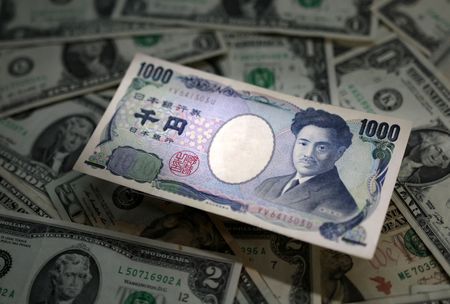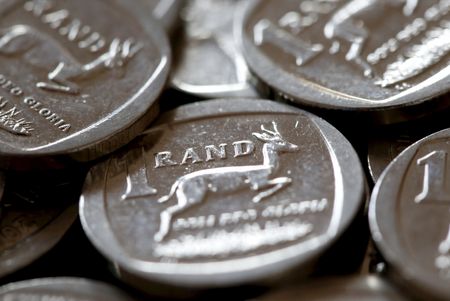By Karen Brettell
NEW YORK (Reuters) -The Japanese yen was heading for a monthly loss against the U.S. dollar on Friday after the Bank of Japan disappointed traders hoping for a more hawkish stance on future rate hikes, while the Federal Reserve dampened expectations for a December rate cut.
The yen clawed back some losses after Japanese Finance Minister Satsuki Katayama said the government has been monitoring foreign exchange movements with a high sense of urgency as the yen weakens.
Core inflation in Tokyo also accelerated in October and stayed above the central bank’s 2% target, data showed on Friday.
BOJ HOLDS RATES
But disappointment after BOJ Governor Kazuo Ueda adopted a less hawkish tone on future rate hikes than hoped held the yen in check. The Japanese central bank kept rates on hold at 0.5%.
Noel Dixon, global macro strategist at State Street Global Markets, said he remains constructive on the yen, adding that “the BOJ ultimately is still going to have to normalize policy at least to 1%.”
“From a multi-year perspective, wages are definitely higher than they’ve been … and the fiscal spending is only going to exacerbate that prospect,” Dixon said.
Japan’s newly elected leader, Sanae Takaichi, is expected to pursue more fiscally expansive policies to boost economic growth.
Against the yen, the dollar was last down 0.1% at 153.96. It is heading for its worst month since July, with the dollar up 4.1% against the currency this month.
The dollar index rose 0.29% to 99.76 and is on track for a 2% monthly gain, its best since July.
The greenback has been boosted by optimism over the economic outlook even as the labor market weakens, while Fed policymakers remain concerned about inflation.
DIVIDED FEDERAL RESERVE
Fed Chair Jerome Powell said on Wednesday that a policy divide within the U.S. central bank and a lack of federal government data may put another interest rate cut out of reach this year.
“It sounded like he was just trying to give himself some optionality,” said Dixon.
The Fed cut rates on Wednesday, as expected, though two policymakers dissented. Governor Stephen Miran again called for a deeper reduction in borrowing costs, while Kansas City Fed President Jeffrey Schmid favored no cut.
Schmid said on Friday that he dissented out of concern that continued high inflation and signs of price pressures spreading in the economy could raise doubts about the central bank’s commitment to its 2% inflation target.
Dallas Fed President Lorie Logan also said on Friday that the Fed should not have cut interest rates this week and should not do so again in December, citing a ‘balanced’ labor market in no immediate need of support and inflation that looks likely to stay above policymakers’ 2% goal for too long.
Fed funds futures traders are pricing in a 65% probability of a cut in December, down from 92% a week ago, according to the CME Group’s FedWatch Tool.
Dixon said he expects the dollar index to consolidate under technical resistance at around 102, before gaining next year when growth is likely to accelerate.
“From a positioning standpoint, it’s clear that investors, at least from a real money perspective, are maxed out from a short perspective, so I think it’s difficult to short it,” he added.
The euro fell 0.31% to $1.1530 after the European Central Bank kept interest rates unchanged at 2% for the third meeting in a row on Thursday and repeated that policy was in a “good place” as economic risks recede. The euro has fallen 1.7% this month, as the dollar gains broadly.
Sterling fell 0.23% to $1.3120, the lowest since April 14, as political pressures grew surrounding British Finance Minister Rachel Reeves. Against the euro, the pound reached its weakest since May 2023.
The pound is heading for a 2.4% drop this month, while gilt yields have dropped on concern over what Reeves’ November budget might mean for businesses, households and overall economic activity.
Traders are also pricing in rising odds of a Bank of England interest rate cut, though the British central bank is viewed as most likely keeping rates on hold when it meets next week.
“While we think GBP sentiment has turned overly bearish, we have long argued against fading the move ahead of the Budget, not to mention the tail risk of the BoE cutting rates next week,” Bank of America analysts said in a report.
In cryptocurrencies, bitcoin gained 2.74% to $110,476.
(Reporting by Karen Brettell; Additional reporting by Amanda Cooper and Gregor Stuart Hunter; Editing by Chizu Nomiyama, Andrea Ricci, Rod Nickel)










